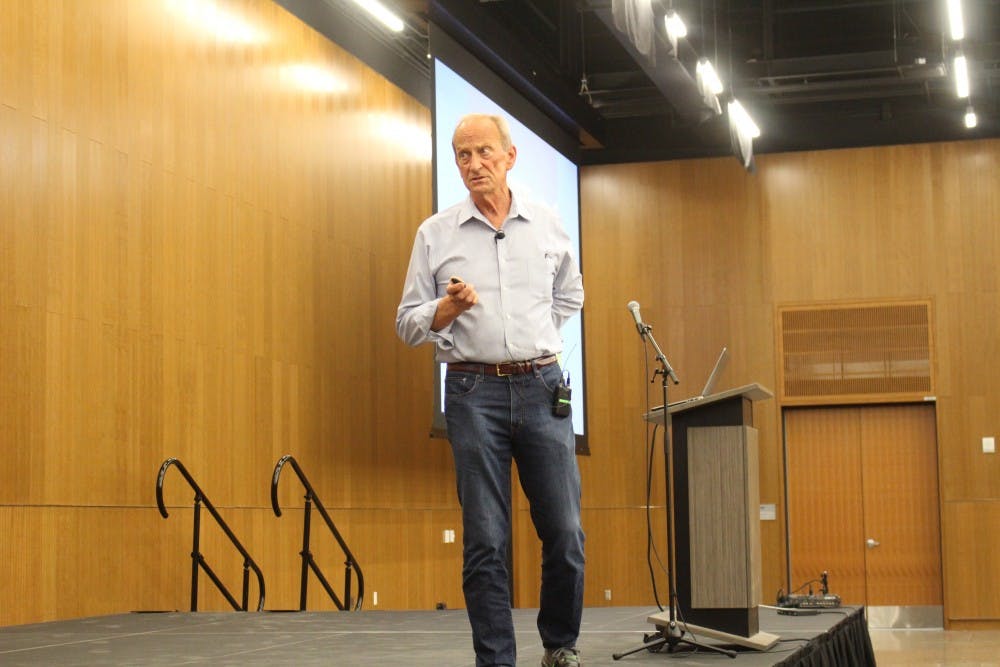Denis Hayes, a longtime environmental advocate known for coordinating the first Earth Day in 1970, gave a talk focusing on sustainable buildings at ASU’s student pavilion on the Tempe campus on Monday, Oct. 2.
Hayes, now the president of the Bullitt Foundation, an organization that created one of the most eco-friendly office spaces in the world, spoke to a crowd of sustainability students, staff and sponsors on developing more sustainable buildings, using the Bullitt Center in Seattle as an example.
The Bullitt Center is outfitted with environmentally conscious additions like retracting windows for natural air conditioning and specialty low-flow toilets to conserve water. The center also treats its own grey water on site.
A certified Living Building Challenge building, the Bullitt Center is one of the most environmentally-friendly buildings in the world, Hayes said.
While the Bullitt Center leaves a much smaller environmental footprint than the typical office, it’s not without minor compromise.
With the building’s windows automatically opening to let in air, tenants need paperweights to counter the breeze. Instead of using the elevator, tenants in the six-story buildings are encouraged to take the stairs. Without a parking garage, workers who drive to work either have to park further away or find a different way to commute.
But these changes are small, and Hayes said that the people who lease in the building are willing to make the compromise.
“Our people tend to be in firms that are the cultural creators,” Hayes said. "We’ve got people in our office doing virtual and augmented reality. We’ve got companies like Sonos here. There’s also something that when you get a critical mass of people wanting to do something, there is a predisposition on part of everybody else to do it.”
Hayes said getting the next generation to make sustainable pushes is crucial for lasting change. He also said that for changes to happen in Phoenix, an area where heat has given it a reputation as one of the least sustainable in the world, institutions like ASU will have to make the push.
“My sense is there have been some political leaders here who have been pretty progressive – unexpectedly progressive,” Hayes said. "But leadership from Phoenix is going to be coming from places like ASU, and churches and other institutions."
The student pavilion, where Hayes gave his talk, is ASU's first zero net energy building and its greenest building to date. Mick Dalrymple, director of University Sustainability Practices, said the panel was inspiring.
“To be able to have the founder of the first Earth Day come ... basically before this building is even officially christened, to have him come and speak in it, is exciting,” Dalrymple said. “This building is on the frontier, and he's talking about a frontier that's even further. It's inspiring to hear him ask where we’re going to go next.”
Dalrymple also said that the talk acts as a reminder that while ASU has made strides such as building an environmentally friendly student pavilion, there’s always room for further improvement.
“This is going to be a LEED-certified platinum building, and you can't get there without addressing these issues," Dalrymple said. "But a living building is another leap up. Hopefully we can have one here on an ASU campus, or we can inspire people in the local community to make the push.”
Nick Lopez, an architecture junior who attended the presentation, said hearing about a building process based in sustainable ideals was refreshing.
“It's good to know there are people out there who actually want to create buildings that give back to the planet,” Lopez said. “When I first started mingling with professionals and learning about how the real architecture world is, it was a little discouraging to know that money rules the world.
"I've been trying to find ways to encourage people to be more sustainable with their choices, and seeing someone like Denis Hayes (wanting) to do something like that is inspiring.”
Reach the reporter at Emmillma@asu.edu or follow @Millmania1 on Twitter.
Like The State Press on Facebook and follow @statepress on Twitter.




